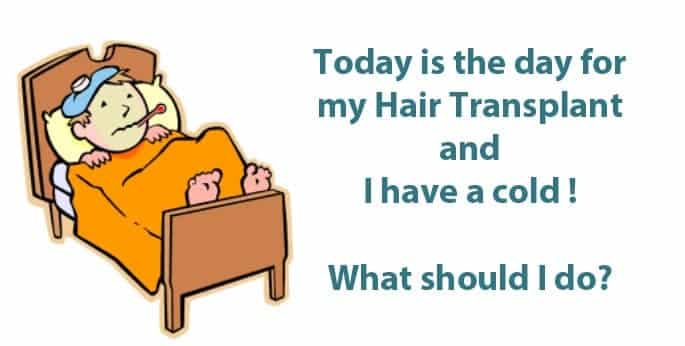What if I’m sick on the day of my hair transplant?

Written by Dr. Alan Feller and Dr. Blake Bloxham- Great Neck, NY
It happens to ALL of us….
We are all human and we are all prone to “Murphy’s law”, so what do you do if on the day of your procedure you do not feel well? What if you have a fever, or the sniffles, or a cough?
Should you tough it out? Perhaps not tell the doctor so he doesn’t cancel the procedure you’ve been waiting for for months ? Maybe tell the doctor you are sick but minimize it by saying it’s not that bad or I’m at the tail end of it?
The cold reality…
For almost a quarter century I have had patients visit for their hair transplant and do all of the above at one time or another.
So then the question becomes:
What do I do ?
I have my full staff ready to work, I am pumped up and ready to do it ( I study all my case photos and strategy the night before so I am totally immerged in what I have to do)
Do I go ahead with the surgery and just “deal” with symptoms of the illness ? What if they traveled from the UK, Europe, or Australia as they often do ? Do I tell them it’s a wash, that they wasted their time and money and should schedule another time ?
The answer sets some people off…
Hair restoration surgery (when performed to high standards) is a meticulous procedure that requires the patient to keep reasonably still. So I personally cannot justify allowing the patient to go through with the procedure because I truly believe I cannot do the very best job on him.
Also, when someone is ill, they feel achy and uncomfortable so it’s just not easy to sit in the procedure chair for long periods of time EVEN with multiple breaks.
So do I tell the patient “sorry, you’ll have to get on a plane, go home, and then find some time in a few months to come back?”
This was the past…
Early on in my practice that was exactly what I used to do. Then I had an idea.
The simple solution…
When I have a patient travel from abroad I cross out a day three or four days after the procedure and will only do a small hair transplant, like an FUE or a small strip. This way I can tell the patient to extend their stay, rest, and give it another try in three days. Even a day has made all the difference for some of my unfortunate patients.
And check this out…
I also use this same technique when the winter is very snowy. In the North East we get enough snow to make driving too dangerous. And I don’t allow my staff and patients to travel dangerous roads just for a hair transplant. So every winter we cross out days to either keep open or only put in small cases so we can do the delayed case while the patient is still in the country and still in the area. I can’t tell you how many times this has helped.
You probably never thought about this…
We are human, we get sick, it’s just how it is. But not just patients, doctor and staff as well. What do we do then? Let’s say not one but two of my technicians are sick that day? Or what if a techs car breaks down? Does the patient have to have a smaller surgery ? Should the surgery be cancelled for lack of “tech power” ?
Another simple solution…
The way I have gotten around that problem is to be overstaffed for most of my procedures. This way if a “double whammy” happens, which it does every few years, there are enough staff to provide a top notch hair transplant. I would expect no less for me and my family, so I expect no less for you and your family.
Everyone gets sick so allowance must be made. I personally have only had one week back in 2010 where I personally simply was too ill to operate. Not bad for 24 years of full time hair transplantation.
Make sure your clinic REALLY makes allowance for illness. Your illness AND theirs. This is why at Feller and Bloxham hair transplant we boast the greatest number of technicians per surgery in the country on the most consistent basis. Other doctors ask me if it is expensive, and I say sure it is, but I know I will get the mission done and that’s my primary concern.
You count !
Demand no less from the clinic you are thinking of booking with and make them state it in writing or in some other way it can’t be denied. Unfortunately, especially as of late, so many new comers to the field has muddied the waters with exaggerations, bent truths, false minimization, and the most popular: omission. Never did the phrase “buyer beware” apply so deeply as it does in the hair transplant field.
If you’re looking for trusted, experienced professionals in Hair Transplant Pennsylvania, ensure you research thoroughly and make an informed decision. Take the first step toward regaining your confidence today!
You have one scalp to use for your hair loss cure, use it wisely !





